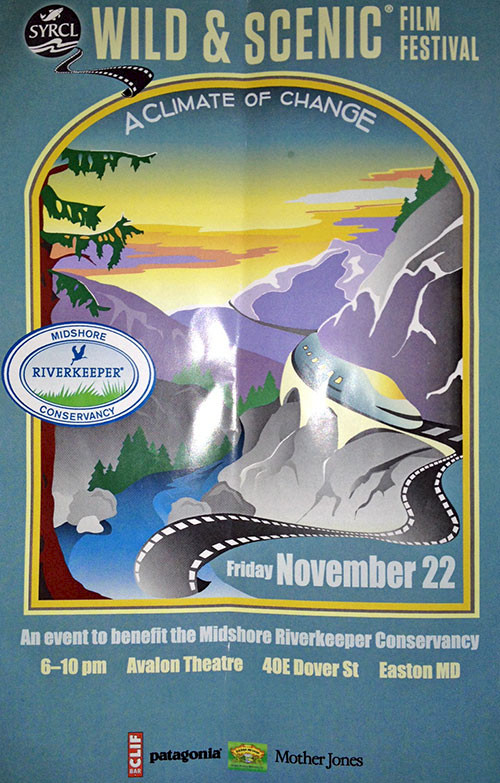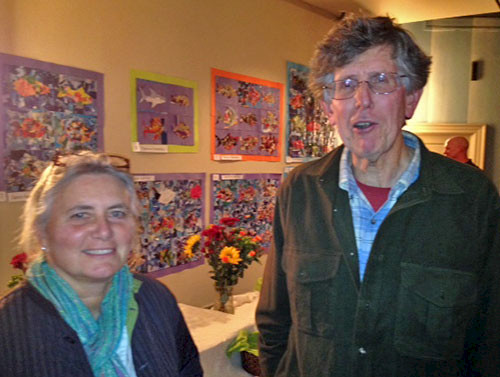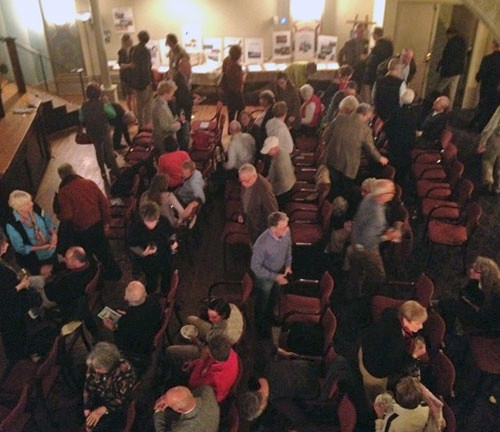Wild & Scenic Environmental Film Festival
Bill Dennison ·I attended a fundraiser event, sponsored by the Midshore Riverkeeper Conservancy at the Avalon Theatre in Easton Maryland on 22 November. The Wild & Scenic Film Festival was started in 2003 by a watershed advocacy group based in California, the South Yuba River Citizens League. This group holds an annual three day event in Nevada City, CA, but then sponsors a one night festival which has spread to over 100 communities nationally. This is the fourth year that the Midshore Riverkeeper Conservancy has held the event, and the Avalon Theatre is an excellent venue. Tim Junkin and his crew from the Midshore Riverkeeper Conservancy did a great job producing this event.

The film festival co-masters of ceremonies were Tom Horton and David Harp. Tom and David are two of the most accomplished and most knowledgeable people regarding Chesapeake Bay. Tom had a distinguished career as the environmental reporter at the Baltimore Sun and has written eight books about Chesapeake Bay. David is a nature photographer who has published photographs in many regional and national magazines and newspapers. Tom and David have teamed up and published several books, based on Tom’s wonderful prose and David’s stunning photographs. I believe that every Chesapeake Bay aficionado should have Tom’s books on their bookshelf and David’s photographs hanging on their walls.
The theme of the film festival was “A Climate of Change”, and the concept behind this was that people need to begin CARING about their environment before they take ACTION, leading to CHANGE. The films were quite varied and all relatively short. The most fun film was “Two Laps” about two elderly Australian men who swam together every morning for 17 years. Every year, they held a race, which was two laps in a saltwater swimming pool, thus the film title. Celine Cousteau, Jacques-Yves Cousteau’s granddaughter and Jean-Michael Cousteau’s daughter, had a film about humpback whales, “Scars of Freedom” which had some magnificent underwater photography. There were a couple of films about climate change and how it was affecting potato farmers in Idaho “Facing Climate Change: Potato Farming” and oyster farmers in Washington State “Facing Climate Change: Oyster Farming”. There were two films which featured stunning nature photography, “Moonwalk” and “Last Light” and an uplifting film “How the Kids Saved the Parks” from California.

The film festival featured three films about Chesapeake Bay. The Chesapeake Bay Foundation produced a film that made the point that environmental restoration was a job producer, not a job killer; “It’s a Job: Debunking the Job Killer Myth”. The Midshore Riverkeeper Conservancy produced a film “Oyster Gardening” about a program that involves the UMCES Horn Point Laboratory Oyster Hatchery, the Oyster Recovery Partnership and Maryland Department of Natural Resources. The film showed the Miles and Wye Riverkeeper Tom Leigh and a crew of citizen volunteers deploying oysters on various piers and docks in Chesapeake Bay. The oyster spat produced in the hatchery are grown in bags suspended in the water column and then collected to be distributed into oyster sanctuaries around the Bay. This was Tom’s final event, as he has joined the Chesapeake Bay Trust, a loss to the Midshore Riverkeeper Conservancy, but a gain for Chesapeake Bay.
My favorite film in the festival was “Holland Island” by Tom Horton and David Harp. This short 4.5 minute film documents the transition of Holland Island from supporting a vibrant community of watermen to a marshy sand bar that is now inhabited by nesting seabirds. Tom had a personal connection with Holland Island and recalled playing baseball in one of the front yards. The film used still photographs, both historical photos and recent photos by David Harp, and Tom narrated and interviewed some former residents. Tom and David, both who have had careers based on print media, have made an amazing transition by displaying their talents in this modern electronic form.

There are three things that I enjoy about events like this film festival. 1) It has a global perspective, but anchors that global perspective with various local issues and activities. 2) It provides inspiration for being better connected and more involved in Chesapeake issues, without a political agenda. 3) It is primarily a fun activity, and not all that serious, which many environmental gatherings tend to be. As a result, I look forward to the next environmental film festival.
About the author
Bill Dennison

Dr. Bill Dennison is a Professor of Marine Science and Vice President for Science Application at the University of Maryland Center for Environmental Science.
Next Post > Ten classic conceptual diagrams: Powerful examples of communicating knowledge
Comments
-
Bill Nuttle 12 years ago
More on Holland Island here: http://ian.umces.edu/blog/2013/02/21/resilience-of-coastal-communities-depends-on-maintaining-social-infrastructure/

